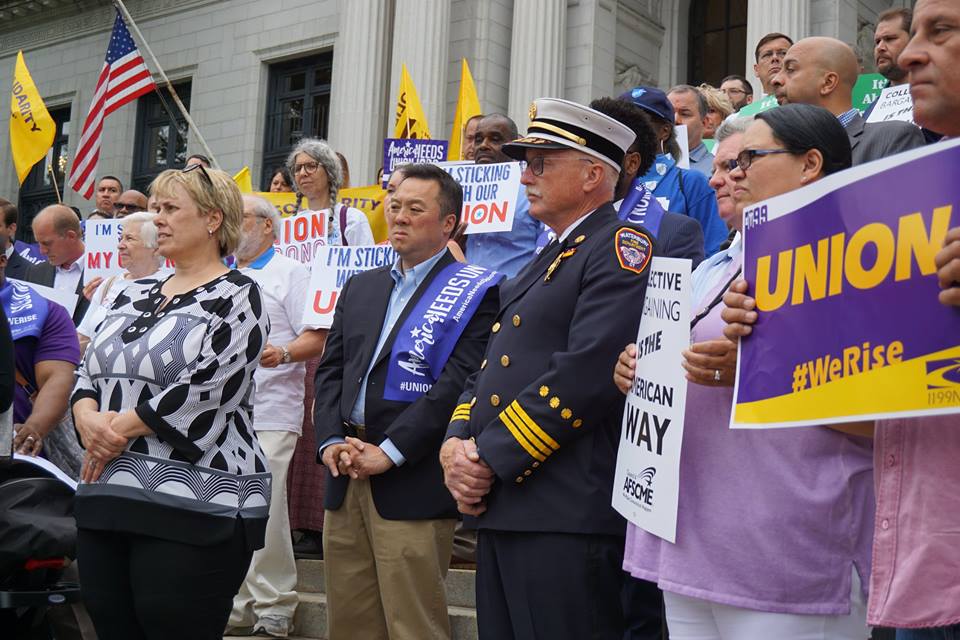A rule change to how Medicaid payments are issued to home healthcare providers implemented by the Donald Trump administration was overturned by a California court in a lawsuit that was backed by Connecticut Attorney General William Tong.
In 2019, the Center for Medicare and Medicaid Services reversed an Obama-era rule that allowed third party deductions – like union dues payments – to be automatically deducted from Medicaid payments, often knows as the “Medicaid dues skim.”
According to law, Medicaid payments can only go to those either receiving services or providing services.
Allowing deductions to third parties not only allowed for union dues to be deducted from home healthcare workers being paid through Medicaid, but also for other benefits.
The rule change from the Trump administration was estimated to affect over 800,000 home healthcare workers across 8 states, including Connecticut.
It is estimated that 350,000 of those home healthcare workers were part of a union and, if allowed to stand, the change would force unions to collect from members individually through checks.
Dues payments for Connecticut home health workers were not affected by the change because, like several other states, Connecticut uses a third-party administrator to issue payments and were given a pass by the Department of Health.
Nevertheless, Connecticut’s Office of the Attorney General signed on to the lawsuit along with California, Massachusetts, Oregon, Illinois and Washington.
In a press release by California Attorney General Xavier Bacerra said “This ruling is a victory for our state and for the collective bargaining rights of homecare workers who play a vital role in our healthcare system. Together, we’ll continue to stand up for workers every step of the way.”
According to a statement provided by the Connecticut Office of the Attorney General, “The federal rule could have interfered with Connecticut’s ability to deduct payments for worker benefits obtained through collective bargaining, like healthcare coverage or voluntary union dues, from homecare workers’ paychecks. This would have disrupted well-established collective bargaining relationships authorized for decades by state labor laws and put at risk the care of seniors and people with disabilities who receive assistance from the Medicaid program.”
“Connecticut joined California and several other states in successfully challenging this rule,” the Attorney General’s Office wrote.
United States District Judge Vince Chhabria wrote in his decision that CMS interpreted the law too broadly and that it violated the Administrative Procedure Act.
“It is unclear how barring the payroll practices would serve the purposes of the Medicaid program,” Chhabria wrote.
According to a study by the Washington-based Freedom Foundation, who helped push for the rule change to eliminate union dues deductions from Medicaid payments, there were more than 358,000 unionized home health care workers across 8 states in 2017.
The total union dues deducted from Medicaid payments in that year totaled $146.6 million, according to their estimates.
Connecticut was listed as having 4,152 home health care workers, contributing $1.3 million to SEIU 1199, which represents the home health care workers in Connecticut.
Gov. Dannel Malloy paved the way for Connecticut home healthcare workers, known as personal care attendants or PCAs, to unionize in 2011 when he created the PCA Workforce Council via executive order after his initial attempt at passing legislation failed.
Although PCAs in Connecticut are not required to be part of the union, the Freedom Foundation found that a little less than half of those PCAs were part of the union in 2017.
Although the Medicaid rule change did not affect PCAs or the union in Connecticut, contract language shows SEIU 1199 was prepared if the legal challenge failed.
According to the PCA Workforce Council contract passed by the legislature in 2018, if payroll dues deductions were no longer permitted, the fiscal intermediary would transfer to the union all their members’ banking information so SEIU could automatically deduct dues from members’ bank accounts.
Connecticut Attorney General William Tong signed onto the multi-state lawsuit and continued to pursue it, saying the federal rule change “directly undermines states’ rights to allow our home care workforce to unionize, to the detriment of our homebound seniors, individuals with disabilities.”
Whether or not CMS will appeal the decision remains to be seen as a new administration under President-elect Joe Biden transitions to power in January.
In a Facebook post, SEIU celebrated the lawsuit win saying, “SEIU members, Fight for $15 Home Care workers and six state AGs fought this racists [sic] and sexist attack against a workforce of mostly women and women of color. The rule would’ve denied us the choice to contribute to our union, our healthcare coverage and put training in jeopardy. When we fight, we win!”


Glenn k
January 6, 2021 @ 4:06 am
Thanks MARC, as usual, good article!